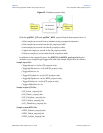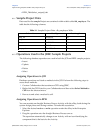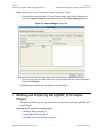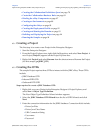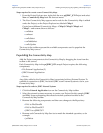
Chapter 6 Section 6.3
Implementing the JDBC/ODBC eWay Sample Projects Running the SQL Script
JDBC/ODBC eWay Adapter User’s Guide 73 Sun Microsystems, Inc.
The script creates the tables and records required by the sample Project.
2 Import the sample Projects.
3 Build, deploy, and run the sample Projects.
You must do the following before you can run an imported sample Project:
Create an Environment
Configure the eWays
Create a Deployment Profile
Create and start a domain
Deploy the Project
4 Check the output.
6.3 Running the SQL Script
The data used for both the JCD and BPEL sample Projects are contained within a table
called db_employee. You create this table by using the SQL statement
JDBC_sample_script.sql, that is included in the sample Project. Note that you must use
a database tool to run the script.
Following is the SQL statement designed for the sample Projects.
drop table db_employee
go
create table db_employee (
EMP_NO int,
LAST_NAME varchar(30),
FIRST_NAME varchar(30),
RATE float,
LAST_UPDATE datetime)
go
The sample Projects provided with the JDBC eWay use input files to pass predefined
data or conditions into the Collaboration or BPEL business process, which then
transforms the database contents, and delivers the ResultSet.
6.4 Importing a Sample Project
Sample eWay Projects are included as part of the installation CD-ROM package. To
import a sample eWay Project to the Enterprise Designer do the following:
1 Extract the samples from the Sun Java Composite Application Platform Suite
Installer to a local file.
Sample files are uploaded with the eWay’s documentation SAR file, and then
downloaded from the Installer’s Documentation tab. The JDBC_eWay_Sample.zip
file contains the various sample Project ZIP files.








